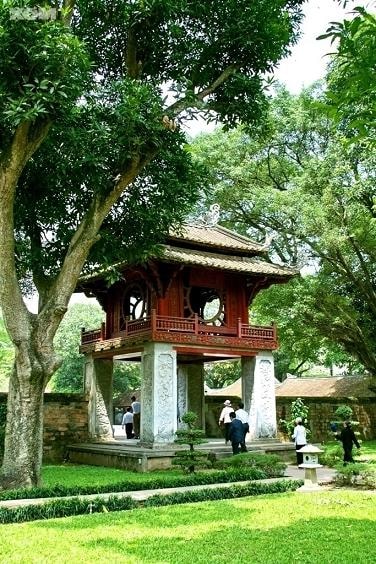Nghe An Confucian scholars in the culture of Thang Long-Dai Viet
The development process of Thang Long - Hanoi is closely linked to the process of converging the cultural quintessence of the whole country. One of the lands that contributed to the thousand-year-old culture is Nghe An. This land is famous for its "grey soil, poor people, thrifty customs, farmers who work hard in the fields, students who love to study" (Dai Nam Nhat Thong Chi) so it is called "a land more famous than all five continents... giving birth to many famous and virtuous people" (Lich Trieu Hien Chuong Loai Chi).
In particular, from the 16th century to the end of the 18th century, in Nghe An, a number of excellent writers appeared with many valuable works that enriched Nghe An culture and made important contributions to the thousand-year-old Thang Long culture of Dai Viet.
 |
Khue Van Cac - Quoc Tu Giam (Hanoi) |
Zen Master Huong Hai(1628-1715), commonly known as To Cau, was originally from Ang Do village, Chan Phuc district (now Nghi Loc district). At the age of 18, he passed the Huong Tien exam and was appointed Tri Phu Trieu Phong. At the age of 30, he resigned from office, became a monk, and took the Dharma name Minh Chau Huong Hai. He practiced to the point of being able to control and master the latent abilities of humans.
Vietnamese Buddhists consider Huong Hai as one of the great trees of the Truc Lam Zen sect. His thoughts were similar to those of many great intellectuals of that time. "Buddhism is not satisfied with reality, considering objective reality as suffering; Confucianism accepts reality, committing to reality. Both are incompatible and coexist in the monk Huong Hai - a great monk, flexible in thought." (History of Vietnamese Thought).
DoThe Way of the Lord, from Cam Nang village, Bich Trieu commune (now Thanh Mai commune, Thanh Chuong). He passed the Huong exam and was appointed as the District Governor of Thach Ha district around 1680-1705. He resigned from office, disguised himself as a merchant and crossed the sea twice to the South to examine mountains, rivers, seas, and islands to complete the Complete Collection of Thien Nam Tu Chi Lo Do Thu. In the section "Tu Chi Lo Do" (Map of the four directions), volume 1 showed the route from Thang Long to Champa...
Pham Nguyen Du, from Dang Dien village, now Nghi Thach commune (Nghi Loc), passed the Hoang Giap exam in 1779, worked as a mandarin, Inspector of Hai Duong, and Governor of Nghe An... His works include: Analects of Literature, Complete Records of the Zhou Dynasty, Nam Hanh Ky Dac Luc, Thach Dong Tien Sinh Thi Tap, and many poems and essays recorded in Nghe An Ky. The most notable of which is the collection Doan Truong Luc, which talks about "the heartbreaking pain of a husband who lost his wife, a lover who lost her lover, creating a strange cry on the poetry scene of medieval Vietnam" (Confucian scholars and talented men of medieval Vietnam). Pham Nguyen Du's literature reflects the liberal thinking and tough character of a Confucian scholar of Nghe An at that time.
Nguyen Huu Chinh,from Co Dan village, Dong Hai commune, now Nghi Loc district. At 16, he passed the Huong Cong exam, then passed the Truong Tam Khoa exam, and became a guest of Huy Quan Cong Hoang Dinh Bao. When Bao was killed, he went to the South to join the Tay Son army. Later, he helped King Le Chieu Thong defeat Trinh Bong and was appointed Binh Chuong Quan Quoc Trong Su, Dai Tu Do, and was given the title of Quan Cong. He was good at military strategy, especially naval warfare, and was also good at poetry and Nom literature. Many contemporary writers admired his talent.
LadyHo Xuan Huong, from Quynh Doi, Quynh Luu. Her father was a scholar from Nghe An, her mother was from Quan Ho (Bac Ninh), thanks to which she was able to create the talented and talented Xuan Huong from the North and the profound knowledge of Nghe An. She was immersed in the cultural cradle of Thang Long-Ke Cho, in the humanitarian movement of the time, so her poetry was imbued with a unique humanism! Her poetry was simple, close, loved by the people and widely circulated to this day. She was known as the "Queen of Nom poetry"...
The above-mentioned typical authors are all from Nghe An, they have lived and been attached to the land of Thang Long for many years. Their talents and personalities have been rubbed, purified, and enhanced in the culture and civilization of Thang Long, and their works have contributed to the diversity and richness of the thousand-year-old civilization of the Capital!
Thanh Phuc (synthesis)






